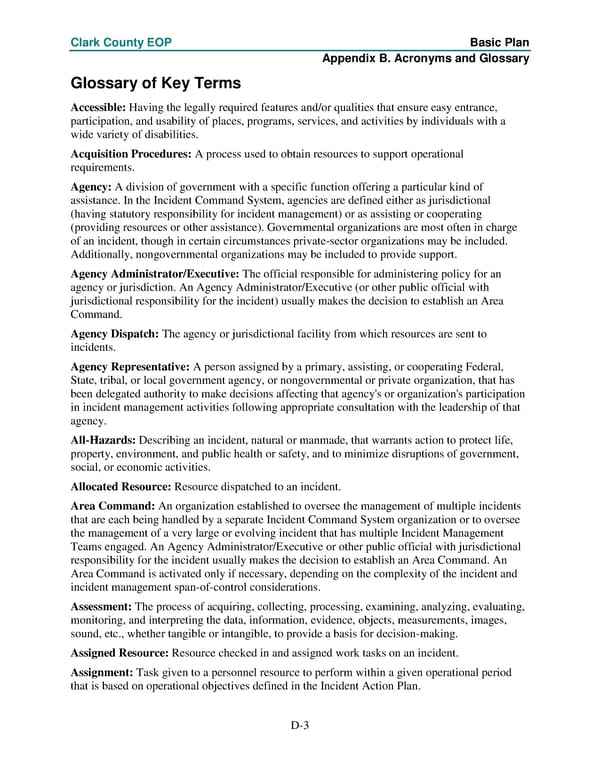Clark County EOP Basic Plan Appendix B. Acronyms and Glossary Glossary of Key Terms Accessible: Having the legally required features and/or qualities that ensure easy entrance, participation, and usability of places, programs, services, and activities by individuals with a wide variety of disabilities. Acquisition Procedures: A process used to obtain resources to support operational requirements. Agency: A division of government with a specific function offering a particular kind of assistance. In the Incident Command System, agencies are defined either as jurisdictional (having statutory responsibility for incident management) or as assisting or cooperating (providing resources or other assistance). Governmental organizations are most often in charge of an incident, though in certain circumstances private-sector organizations may be included. Additionally, nongovernmental organizations may be included to provide support. Agency Administrator/Executive: The official responsible for administering policy for an agency or jurisdiction. An Agency Administrator/Executive (or other public official with jurisdictional responsibility for the incident) usually makes the decision to establish an Area Command. Agency Dispatch: The agency or jurisdictional facility from which resources are sent to incidents. Agency Representative: A person assigned by a primary, assisting, or cooperating Federal, State, tribal, or local government agency, or nongovernmental or private organization, that has been delegated authority to make decisions affecting that agency's or organization's participation in incident management activities following appropriate consultation with the leadership of that agency. All-Hazards: Describing an incident, natural or manmade, that warrants action to protect life, property, environment, and public health or safety, and to minimize disruptions of government, social, or economic activities. Allocated Resource: Resource dispatched to an incident. Area Command: An organization established to oversee the management of multiple incidents that are each being handled by a separate Incident Command System organization or to oversee the management of a very large or evolving incident that has multiple Incident Management Teams engaged. An Agency Administrator/Executive or other public official with jurisdictional responsibility for the incident usually makes the decision to establish an Area Command. An Area Command is activated only if necessary, depending on the complexity of the incident and incident management span-of-control considerations. Assessment: The process of acquiring, collecting, processing, examining, analyzing, evaluating, monitoring, and interpreting the data, information, evidence, objects, measurements, images, sound, etc., whether tangible or intangible, to provide a basis for decision-making. Assigned Resource: Resource checked in and assigned work tasks on an incident. Assignment: Task given to a personnel resource to perform within a given operational period that is based on operational objectives defined in the Incident Action Plan. D-3
 Emergency Operations Plan Page 106 Page 108
Emergency Operations Plan Page 106 Page 108